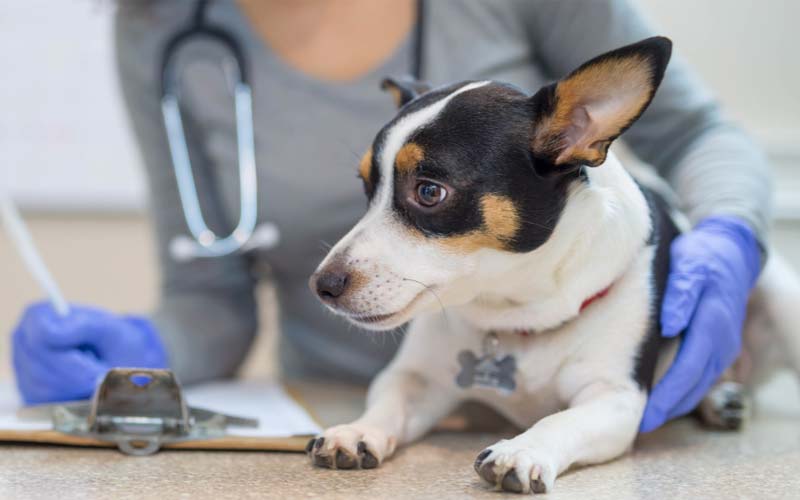Meningitis in dogs is a serious and potentially life-threatening condition that affects the protective membranes surrounding the brain and spinal cord. While it’s not as common as other canine illnesses, its impact can be devastating if left untreated. Early recognition of the symptoms and prompt veterinary intervention are critical in improving outcomes.

This article is designed to provide dog owners with essential knowledge about meningitis, including its causes, symptoms, diagnosis, treatment options, and preventive measures. By understanding this condition, you can better protect your furry companion and act swiftly if warning signs arise. Whether you’re a new pet owner or an experienced caretaker, this guide will equip you with the information needed to ensure your dog’s well-being.
1. What Is Meningitis in Dogs?
Meningitis in dogs is an inflammatory condition affecting the meninges—the protective membranes surrounding the brain and spinal cord. This inflammation disrupts the central nervous system’s function, leading to a range of neurological symptoms that can escalate rapidly without treatment. Meningitis can severely impact a dog’s quality of life, making early detection and intervention crucial.
The condition primarily manifests in two forms: infectious meningitis and immune-mediated meningitis. Infectious meningitis results from bacterial, viral, fungal, or parasitic agents invading the central nervous system. In contrast, immune-mediated meningitis, such as Steroid-Responsive Meningitis Arteritis (SRMA), arises from the body’s immune system mistakenly attacking its own tissues. SRMA is particularly common in certain breeds like Beagles, Boxers, and Bernese Mountain Dogs, and often involves severe neck pain and fever as hallmark symptoms.
Understanding the nature of meningitis and its underlying causes can help dog owners recognize warning signs early. While both forms of meningitis require immediate veterinary care, immune-mediated types like SRMA often respond well to corticosteroid treatments, offering hope for recovery with proper management. By familiarizing yourself with this condition, you’re better equipped to protect your dog’s health and well-being.

2. Causes and Risk Factors of Meningitis in Dogs
Meningitis in dogs can arise from a variety of causes, broadly classified into infectious and immune-mediated origins.
Causes
- Infectious Agents: Bacteria, viruses, fungi, and parasites are common culprits behind meningitis. These pathogens can invade the nervous system through direct infection or secondary complications from untreated diseases, such as severe ear or sinus infections.
- Immune-Mediated Factors: In some cases, the body’s immune system malfunctions, attacking its own tissues and causing inflammation. Steroid-Responsive Meningitis Arteritis (SRMA) is a prime example of an immune-mediated form of this disease, commonly seen in certain breeds.
Risk Factors
- Breed Susceptibility: Specific breeds like Beagles, Boxers, and Bernese Mountain Dogs are genetically predisposed to immune-mediated meningitis, particularly SRMA.
- Age: Young to middle-aged dogs are more prone to developing meningitis, as their immune systems may be more reactive or less robust.
- Immune Vulnerabilities: Dogs with weakened immune systems, whether due to age, illness, or certain medications, are at higher risk of contracting infectious meningitis.
By understanding these causes and risk factors, dog owners can take preventive steps, such as ensuring timely vaccinations and seeking prompt medical attention when symptoms arise, to safeguard their pet’s health.

3. Recognizing Symptoms of Meningitis in Dogs
Recognizing the symptoms of meningitis in dogs is essential for ensuring timely treatment, as this condition can progress rapidly and lead to severe complications if left untreated.
Common Symptoms
Dogs with meningitis often exhibit physical signs that reflect inflammation in their nervous system. These include:
- Fever: A persistent high temperature is a hallmark symptom.
- Stiff Neck: Dogs may struggle to move their head or neck comfortably due to pain and stiffness.
- Sensitivity to Touch: Increased sensitivity, especially around the neck or spine, is common.
- Seizures: Uncontrolled muscle spasms or loss of consciousness may occur in severe cases.
- Uncoordinated Movements: Difficulty walking, staggering, or general unsteadiness can signal neurological issues.
Behavioral Changes
In addition to physical symptoms, meningitis can cause noticeable behavioral changes, including:
- Lethargy: A sudden lack of energy or enthusiasm for activities.
- Irritability: Increased sensitivity or aggression when touched or approached.
- Loss of Appetite: Refusal to eat, often accompanied by general malaise.
Why Early Detection Matters
Meningitis is a medical emergency. Its rapid progression can result in permanent neurological damage or even death if untreated. Early detection allows for prompt veterinary intervention, which is critical in managing the condition effectively. If you observe any combination of these symptoms, seek immediate veterinary care. Timely diagnosis and treatment can greatly improve your dog’s chances of recovery and long-term well-being.

4. How Is Meningitis Diagnosed in Dogs?
Diagnosing meningitis in dogs requires a thorough approach to identify the condition and rule out other possible causes of neurological symptoms. Veterinarians use a combination of physical exams, advanced imaging, and laboratory tests to confirm the diagnosis.
Neurological Exams
The diagnostic process typically begins with a detailed neurological exam. This involves assessing your dog’s reflexes, coordination, and pain response to pinpoint abnormalities in the nervous system. These findings guide the next steps and help identify the areas most affected by the inflammation.
Imaging Techniques
Advanced imaging, such as MRI (Magnetic Resonance Imaging) or CT (Computed Tomography) scans, provides detailed views of the brain and spinal cord. These tools can reveal signs of swelling, structural abnormalities, or other conditions that may mimic meningitis, such as tumors or herniated discs.
Cerebrospinal Fluid (CSF) Analysis
A definitive diagnosis often requires a cerebrospinal fluid (CSF) analysis. This involves extracting a small sample of the fluid surrounding the brain and spinal cord through a procedure called a spinal tap. Testing the CSF can detect inflammation, identify infectious agents, or suggest immune-mediated causes.
Importance of Thorough Testing
Meningitis shares symptoms with other neurological disorders, making it essential to rule out conditions like encephalitis, brain tumors, or toxin exposure. Accurate diagnosis ensures the correct treatment plan, increasing the likelihood of a positive outcome for your dog.

5. Treatment Options and Recovery for Meningitis in Dogs
Treating meningitis in dogs requires a comprehensive approach, involving medications, supportive care, and close monitoring. The specific treatment plan will depend on the cause of the meningitis, whether infectious or immune-mediated, and the severity of the condition.
Treatment Plans
Medications:
- Antibiotics: If the meningitis is caused by a bacterial infection, antibiotics will be prescribed to target the specific bacteria.
- Antivirals or Antifungals: In cases of viral or fungal meningitis, antiviral or antifungal medications may be used to control the infection.
- Corticosteroids: For immune-mediated conditions like Steroid-Responsive Meningitis Arteritis (SRMA), corticosteroids are often prescribed to reduce inflammation and suppress the overactive immune response.
Supportive Care:
- IV Fluids: Dehydration is a common concern for dogs with meningitis, so intravenous fluids help maintain hydration and support overall health.
- Pain Relief: Managing pain is essential, as the inflammation around the brain and spinal cord can be extremely painful. Non-steroidal anti-inflammatory drugs (NSAIDs) or other pain medications may be administered.
- Rest: A quiet, comfortable environment for rest is crucial during recovery. Limiting activity helps reduce strain on the body and supports the healing process.
Prognosis
The prognosis for dogs with meningitis depends largely on the cause, how early the condition is diagnosed, and how well the dog responds to treatment. Early intervention significantly improves the chances of a full recovery, with many dogs returning to normal health after treatment. However, dogs with severe or untreated meningitis may face long-term neurological damage, including difficulty walking, seizures, or cognitive dysfunction.
Realistic Expectations
While many dogs recover with timely intervention, recovery may take weeks to months. Some dogs may experience relapses or require long-term medication to manage inflammation. It’s important for dog owners to be patient and follow the veterinary team’s recommendations to ensure the best outcome. With appropriate care, most dogs can lead normal lives post-recovery.

6. Prevention and Long-Term Care for Meningitis in Dogs
While it may not be entirely possible to prevent all forms of meningitis, taking proactive steps can help reduce the risk, particularly in relation to infectious causes.
Preventive Measures
- Vaccinations: Ensuring your dog is up-to-date on vaccinations is one of the most effective ways to prevent infectious meningitis. Vaccines against diseases like distemper and leptospirosis help protect against infections that could lead to meningitis.
- Proper Hygiene and Parasite Control: Maintaining good hygiene and using effective parasite control products can reduce the risk of infections that may cause meningitis, such as ticks, fleas, and certain intestinal parasites. Regularly cleaning your dog’s living environment and grooming them also helps minimize infection risks.
Long-Term Management
For dogs that have had meningitis, long-term care is essential to monitor for potential complications or recurrence.
- Regular Veterinary Check-Ups: Dogs with a history of meningitis should have routine veterinary check-ups to ensure their neurological health is stable. Regular exams allow your vet to catch any early signs of inflammation or infection before they escalate.
- Monitoring for Recurrence or Complications: Owners should watch for any new symptoms, such as behavioral changes, uncoordinated movements, or pain. If any signs reappear, immediate veterinary attention is critical to prevent further damage.
With consistent care and preventive measures, dogs who recover from meningitis can live happy, healthy lives with a reduced risk of recurrence.

Conclusion Meningitis in Dogs
Meningitis in dogs is a serious condition that requires prompt recognition, diagnosis, and treatment. Whether caused by an infectious agent or an immune-mediated response, meningitis can significantly impact your dog’s health and well-being. Early symptoms such as fever, neck stiffness, and seizures should not be ignored, and immediate veterinary care is essential for a favorable outcome.
Treatment typically involves a combination of medications, supportive care, and rest. With timely intervention, many dogs make full recoveries, although some may need long-term management to prevent recurrence. Preventive measures, including vaccinations and proper hygiene, can help reduce the risk of meningitis caused by infections. For dogs with a history of meningitis, regular check-ups and vigilant monitoring for any signs of relapse are crucial for maintaining long-term health.
As a dog owner, being proactive about your pet’s health is the best way to ensure they stay safe and thrive. If you notice any concerning symptoms, don’t hesitate to consult your veterinarian. Early intervention can make all the difference, so take action today to protect your furry friend from this potentially debilitating condition. Your dog’s health and happiness depend on your awareness and care.